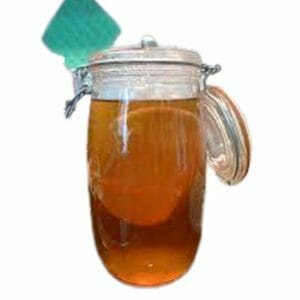Kombucha is a delicious beverage with a distinctive flavor. This drink is made from the Fermentation of sweet tea by a symbiotic combination of bacteria and yeast but it’s a common question why does kombucha taste like vinegar when we make it home. Although kombucha tastes sour, the fermentation process transforms the alcohol in the liquid into lactic acid and acetic acid.
These organic acids give kombucha its characteristic flavor. The acetic acid taste is similar to that of vinegar. Some believe that vinegar was the first fermented beverage. Vinegar has been produced for thousands of years. Vinegar makers first developed recipes based on local bacteria and yeasts. In the same way, manufacturers today make different types of kombucha according to what region and type of tea they use.
The difference between kombucha and vinegar test:
The difference between kombucha and vinegar is that kombucha has a slightly sweet taste, while vinegar has a bitter taste. Vinegar is usually made from wine grapes, but other fruits, such as apples, plums, and even pineapple, can be used. Kombucha is made from a fermented mixture of tea and water. The yeast converts the sugar into alcohol, and the bacteria convert the alcohol to carbon dioxide and lactic acid. The yeast and bacteria combine to convert the sugar to ethanol and carbon dioxide. The yeast and bacteria also create a unique flavor profile in the finished product. The taste of the final beverage is determined by both the ratio of the microorganisms and the type of sugars present.
What makes kombucha taste like vinegar?
 Kombucha (Kombucha is a popular fermented tea drink) tastes very much like vinegar. There are only two different kinds of bacteria that are used to ferment kombucha: acetic acid-producing bacteria (which is what makes the vinegar taste sour) and lactobacillus.
Kombucha (Kombucha is a popular fermented tea drink) tastes very much like vinegar. There are only two different kinds of bacteria that are used to ferment kombucha: acetic acid-producing bacteria (which is what makes the vinegar taste sour) and lactobacillus.
Kombucha tastes like vinegar because it contains acetic acid. This acid is an organic compound that is used as a preservative. It is also an essential part of the process of brewing kombucha. Acetic acid is a chemical compound that is found in vinegar. So, when you drink kombucha, you drink a little vinegar.
Things that will Cause your Kombucha to Taste Like Vinegar
The texture of kombucha is unique. It is bubbly but not overly thick. You can have it like any other soda, but it is best enjoyed on its own, unfiltered. The texture of kombucha is quite different from that of soda. Soda is very thick and syrupy. Kombucha is much thinner. It has a pleasant fizziness to it.
1. Over-fermentation
Any of these three factors can disrupt the fermentation process. It is always good to check on your kombucha and ensure it has not fermented too much. Sometimes, it can ferment to alcohol level and taste like vinegar. If you notice that your kombucha tastes like vinegar, the fermentation process has been disrupted. The solution is to start over again with new tea leaves.
Over-fermentation can occur when kombucha is brewed at too high a temperature for too long. Sometimes, it is caused by too much sugar, which encourages the growth of bacteria. Bacteria can be introduced into the tea mixture when kombucha is served warm or at room temperature. It can happen when the tea is prepared with raw or partially used SCOBY. Bacteria can be introduced during the packaging and storage of the brew. In addition, over-fermented kombucha can sometimes have a sharp odor.
Fermenting the kombucha too long can cause it to taste like vinegar. This can happen if you ferment your kombucha too long. When you are fermenting your kombucha, make sure that you are keeping a close eye on it. You can tell if the Fermentation has gone too far by looking at the amount of foam on the top of the jar. If there is a lot of foam, you have gone too far. When you notice this, it is time to bottle.
2. High pH
If your kombucha is too acidic, it will taste like vinegar. So, ensure that you are brewing your kombucha to keep it at a proper pH.
If the pH of your kombucha gets too high, it can affect the taste of your drink. High pH levels can occur when your kombucha gets too warm. You must remember to keep it cold when you are fermenting your kombucha.
To avoid these problems, you must use the correct amount of sugar, a good quality black tea, and keep the kombucha fermenting in the refrigerator. The best way to avoid problems is to use a thermometer and observe the temperature.
3. Heat:
The proper temperature for a fermenting container should be between 64 degrees and 72 degrees Fahrenheit. If the temperature is too high or too low, the growth of bacteria will be inhibited, and the kombucha will not develop properly. You should also keep the kombucha covered to keep out dust. If you do this, the kombucha will not dry out, and you will be able to save some of the sweetened beverages later.
If you are using a kettle, you should not use boiling water. The temperature of the water should be around 170 degrees Fahrenheit. The boiling point of water is 212 degrees. It means that the boiling point of the water is 10 degrees lower than the temperature of the water. The reason for this is that the water is being heated to a higher temperature than the boiling point of the water.
4. Bacterial Contamination
When you brew your kombucha, you want to ensure that you use clean equipment. If you are not using clean equipment, you can end up with bacterial contamination. When you brew your kombucha, you want to ensure that you use clean equipment. So, washing your equipment thoroughly before using it is essential.
Some kombuchas can have a strong vinegar taste. It is because they are contaminated with bacteria. The bacteria could be from the water or the air. You may notice a vinegar smell if you have brewed for a long time.
5. Wrong Sugar
The type of sugar used in your kombucha is essential. You should be using the sugar you would use to sweeten a drink. So, if you use table sugar, you are probably doing it wrong.
If you are using cane sugar, you may find that your kombucha tastes very sweet. It is because the sugar in the cane is processed differently than the sugar in black tea.
If your kombucha has a very sour taste, you may have a problem with your brewing process. It is because the pH level of your brew is too high. When you brew kombucha, you should always be sure to keep the pH at a low level.
5. Brewed Too Long
When you brew your kombucha, it is vital to ensure that you keep a close eye on it. You want to ensure you are not letting it get too far. If you let it go too far, your kombucha will taste like vinegar.
You may have problems brewing your kombucha for a long time. Some people say that they can taste a little alcohol in their kombucha. It can be a sign that you have brewed it too long.
How do I make my own kombucha?
You can make kombucha at home. All you need to do is to add 1 quart of boiling water to a quart jar of pure white sugar, then add four tea bags and four tablespoons of honey. You should shake it well to mix everything and wait 48 hours. Then you should strain the mixture into a clean glass jar. You should leave the liquid in the glass jar to cool down. When the mixture has cooled, you can add 3 cups of water and a cup of apple cider vinegar. Leave the mixture in a warm place (between 80°F and 90°F) for about seven days.
Health benefits of drinking kombucha:
 Drinking kombucha has been linked to several health benefits. The beneficial microorganisms in the brew can help fight viruses and strengthen your immune system.
Drinking kombucha has been linked to several health benefits. The beneficial microorganisms in the brew can help fight viruses and strengthen your immune system.
When raw and unpasteurized, kombucha is rich in probiotics — the healthy gut bacteria associated with heart health, lower rates of anxiety and depression, fewer yeast infections, weight management, boosted immunity, and, you guessed it, improved digestive health.
You can also drink kombucha because it contains a unique mixture of nutrients that can help boost your immune system, improve your skin, and protect against cancer.
Another benefit of drinking kombucha is that it helps to reduce inflammation. Inflammation is linked to arthritis, diabetes, and several other conditions.
Drinking kombucha may also help to lower cholesterol levels and reduce the risk of heart disease.
Here are some of the benefits you may receive from drinking kombucha:
*It can improve your digestion.
*It can also make your hair healthier.
*It can be used as an effective natural remedy for many health problems.
*The final benefit of drinking kombucha is that it is naturally caffeine-free.
Side effects of drinking too much kombucha:
The recommended serving size of kombucha is one cup. The fermented drink can help to fight off viruses. According to the Centers for Disease Control and Prevention, you can safely consume four ounces of kombucha daily. There are no reported cases of kombucha causing illness. However, drinking too much of this beverage can lead to gastritis and diarrhea.
If you drink too much kombucha, you might get a headache. You might also feel tired. This is because drinking too much kombucha might contain high amounts of caffeine. Some people prefer the taste of kombucha over coffee. They drink kombucha because they like the way it tastes. Some people believe that kombucha contains health benefits. It may be true that drinking too much kombucha can cause weight gain. However, you may not gain weight if you drink too much kombucha.
However, there are also specific side effects associated with drinking kombucha. It can cause headaches and gastrointestinal problems.
Because it contains alcohol, it is also a diuretic.
The body can’t digest and process large amounts of kombucha quickly. The sugar can accumulate in your stomach. The sugar may cause bloating, which is painful.
Conclusion:
Kombucha is not just a beverage. It is a fermented tea containing a complex mixture of microorganisms. The process begins with sugar being added to water. These ingredients are mixed and left out in the sun to allow the sugar to convert into alcohol. The resulting fermented liquid is left to mature in the refrigerator or at room temperature for several weeks. The longer the kombucha develops, the stronger the flavor of the drink. Kombucha is made from black tea leaves. The fermentation process adds the desired taste and smell to the glass.
The process starts when a group of microorganisms is introduced to the tea leaves. These organisms are microscopic.